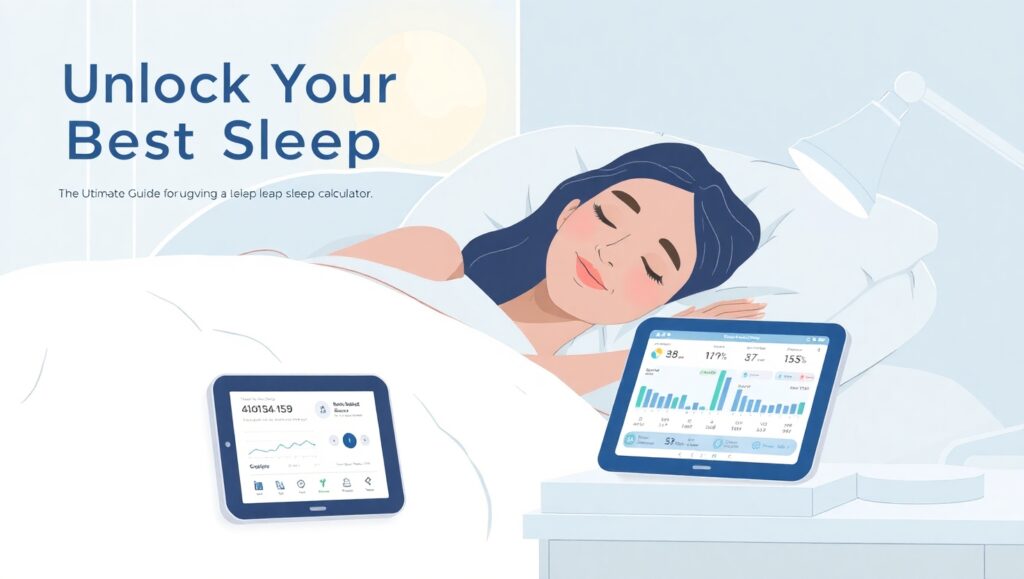Do you ever set your alarm for a full 8 hours of sleep, only to wake up feeling groggy, exhausted, and desperately reaching for the snooze button? It’s a frustratingly common experience. The problem might not be how much sleep you’re getting, but when you’re waking up.
Enter the sleep calculator.
This simple yet powerful tool is your secret weapon for mastering your mornings and waking up feeling genuinely refreshed. Forget random alarm times. A sleep calculator uses the science of your body’s natural rhythms to pinpoint the perfect moment to wake up.
What is a Sleep Calculator and How Does It Work?
A sleep calculator, sometimes called a bedtime calculator or a wake-up time calculator, doesn’t just count hours. Instead, it works based on the principle of sleep cycles.
Our sleep isn’t one long, uniform state. We cycle through different stages of sleep throughout the night. A complete sleep cycle lasts approximately 90 minutes and consists of four main stages:
- Stage 1 (N1): The light, “dozing off” stage. You can be easily awakened.
- Stage 2 (N2): Your body temperature drops and heart rate slows. You are now truly asleep.
- Stage 3 (N3): This is deep sleep, crucial for physical repair, muscle growth, and immune system function. Waking up from this stage is extremely difficult and is the primary cause of “sleep inertia”—that heavy, disoriented feeling.
- REM Sleep: The stage where most dreaming occurs. Your brain is highly active, consolidating memories and processing information.
The key takeaway is this: Waking up in the middle of a deep sleep cycle (N3) is what makes you feel terrible. A sleep calculator helps you avoid this by scheduling your alarm to go off between these 90-minute cycles, when you are in a much lighter stage of sleep.
Image Alt Text: A person sleeping peacefully in a comfortable bed, illustrating the benefit of using a sleep calculator for better rest.
How to Use a Sleep Calculator: A Step-by-Step Guide
Using a sleep calculator is incredibly simple. You just need to decide which question you want to answer.
Scenario 1: You know what time you need to wake up.
Let’s say you need to be up at 6:30 AM.
- Input your wake-up time: Enter 6:30 AM into the calculator.
- Get your ideal bedtimes: The calculator will work backward in 90-minute increments. It will suggest you go to bed at:
- 9:15 PM (for 6 cycles, or 9 hours of sleep)
- 10:45 PM (for 5 cycles, or 7.5 hours of sleep)
- 12:15 AM (for 4 cycles, or 6 hours of sleep)
- Factor in sleep latency: Remember, these are the times you should be asleep, not the times you get into bed. The average person takes about 15-20 minutes to fall asleep. So, if you choose the 10:45 PM bedtime, you should probably get into bed around 10:25 PM.
Scenario 2: You want to go to sleep now.
Let’s say it’s 11:00 PM and you’re ready to sleep.
- Input your current time: Tell the calculator you want to go to sleep now.
- Get your ideal wake-up times: The calculator will add 90-minute cycles to your current time (plus the 15 minutes to fall asleep). It will suggest you wake up at:
- 6:45 AM (5 cycles)
- 8:15 AM (6 cycles)
- 9:45 AM (7 cycles)
By choosing one of these times, you are much more likely to wake up feeling alert and ready for the day.
The Benefits of Aligning with Your Sleep Cycles
Why go through this effort instead of just setting an alarm? The benefits are significant.
- Wake Up Feeling Refreshed: This is the biggest advantage. By avoiding the deep sleep trap, you minimize sleep inertia.
- Eliminate the Snooze Button: When your body is naturally ready to wake up, you won’t feel the compulsive need to hit snooze.
- Establish a Consistent Rhythm: Using a bedtime calculator helps train your body’s internal clock (circadian rhythm), making it easier to fall asleep and wake up naturally over time.
- Boost Cognitive Function: Quality sleep is directly linked to better memory, focus, and problem-solving skills.
- Improve Your Mood: Waking up groggy can put a damper on your whole day. Starting your morning with energy can have a major positive impact on your mood.
Frequently Asked Questions (FAQ)
1. How much sleep do I really need? While the 90text−minutesleepcycle is a great guide, total sleep time still matters. According to the CDC, most adults need 7-9 hours of sleep per night. Teenagers need 8-10 hours, and school-aged children need 9-12 hours. A sleep calculator helps you achieve that target in the most effective way.
2. Are sleep calculators 100% accurate? They are an excellent guide, but individual sleep cycles can vary slightly, ranging from 70 to 110 minutes. Use the calculator as a starting point and see what works best for you. If you consistently feel groggy, try adjusting your alarm by 10-15 minutes earlier or later.
3. What if I wake up in the middle of the night? Brief awakenings are normal. If you wake up and can’t get back to sleep within 20 minutes, it’s often better to get out of bed and do a quiet, relaxing activity (like reading a book in dim light) until you feel sleepy again, rather than tossing and turning.
Your Challenge for Tonight
Don’t just take our word for it. Try it yourself!
Decide what time you need to wake up tomorrow, use a sleep calculator to find your ideal bedtime, and commit to it. Notice how you feel when the alarm goes off. You might just find it’s the best morning you’ve had in a long time.
What’s your biggest challenge with sleep? Share your experience in the comments below!
